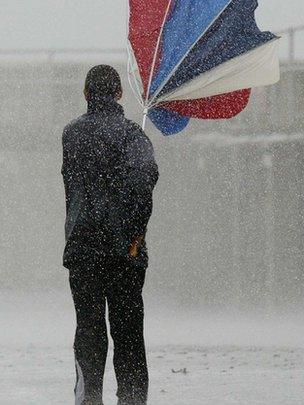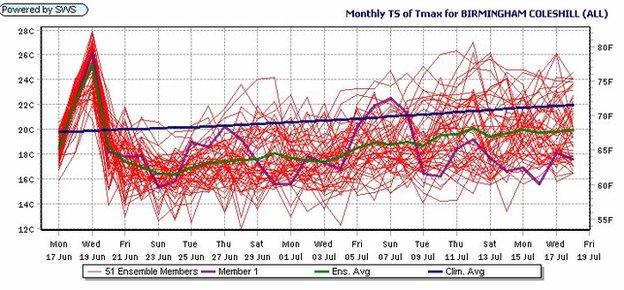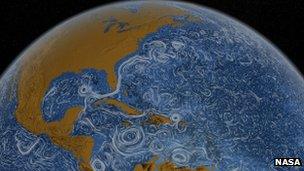What's going on with the weather?
- Published
- comments

The reasons for changing weather are not fully understood
Treat the following news with caution. And, whatever you do, don't blame the weather people. Or me.
But the next few weeks in Britain are likely to be - wait for it - cooler than average.
Sorry.
Forecasts looking that far ahead are not usually released with a huge fanfare because the people who produce them aren't sure of them.
The more distant the forecast, the greater the difficulty of getting it right. So many things can change to make the weather better than expected - or worse.
Don't dwell on the graph lower down this page if you are hungry for sunshine.
It is from the European Centre for Medium-range Weather Forecasts, external, based in Reading, and it is an assembly of a wide range of different weather forecasts, external.
The idea is that you bundle them together and see what most of them suggest.
They could all be wrong, of course. But generally this "ensemble" of projections is a useful way of picking out a trend.
The thick line across the middle shows the average temperature for this time of year in Coleshill in the West Midlands.
The red squiggles show the different forecasts. A few do point to warmer-than-average temperatures, which could be cheering, but most of the forecasts are for the opposite, which won't be.
The thick green line shows the average of all the forecasts - and this is also well below average. I won't bother saying sorry any more.
Jet stream
Generally, the advent of satellites to watch the weather systems and supercomputers to crunch the numbers has led to a massive increase in the accuracy of forecasting, especially over the next few days.
But what is progressing far more slowly is an understanding of exactly why we get the weather we do.

I tried to tackle this question last year and I am getting a wave of déjà vu exploring it all over again.
A possible starting point is the now infamous jet stream. In recent years we have heard a lot about this great atmospheric river flowing in the wrong place and ruining our summers.
The basic rule is that if you're to the north of the jet stream during the summer, your weather is worse than normal, meaning cooler and wetter; if you're south of it, conditions are drier and warmer. And right now, most of Britain is on the wrong side of the line.
But the jet stream only flows the way it does because it's pushed and shaped by a range of huge forces that scientists have not fully grasped: the battles of the air masses, the stirrings of the oceans, the tumult on the surface of the Sun.
And maybe our own greenhouse gases are a factor as well, warming the atmosphere and allowing it to hold more moisture. The jet stream is merely a symptom of underlying factors, a puppet of greater powers.
That is what Tuesday's gathering of weather specialists at the Met Office in Exeter was all about - exploring what is known and what is not known about the key influences.
Extreme seasons

Ocean current changes may influence weather
The talks looked at three extreme seasons: our cold spring this year, our wet summer last year and the freezing winter of 2010-11.
One line of research suggests that colder winters may be linked to changes in the Sun's ultraviolet output.
Data apparently show a possible connection - but the precise mechanism is not yet fully understood.
Another angle points to the recent massive summer melting of Arctic sea-ice - which retreated to a 30-year record last September.
The idea is that a warmer Arctic reduces the difference in temperature that normally exists between the hot tropics and the cold polar regions - a difference that forms a fundamental driver of the oceans and air as the planet tries to redistribute heat. Warm the Arctic and you destabilize weather patterns, maybe.
A third line of investigation is into the oceans, those vast bodies of water that absorb and release gargantuan quantities of heat.
A research paper last year suggested that the temperature of the surface of the North Atlantic was linked to British weather, and that the ocean went through cycles of heating and cooling lasting several decades.
And - in case you're wondering - the last cycle started in 2007 and may last another 5-10 years at least. Depressing, unless these researchers are wrong.
Yet another factor is the amount of moisture in the air. As the atmosphere warms, it can hold more water - and the level has risen by about 4% over the past 30 years. Damper air means damper weather. Probably.
Much to learn
When I joined a research flight last year the scientists were open about what they still don't know, as they flew into a weather front to gather data about temperature, humidity and pressure.
No surprise, the Met Office meeting did not produce any startling conclusions. Instead it pointed to areas where more research is needed (though scientists always say that more research is needed.)
For reasons that are not fully clear, the Met Office itself seemed curiously coy about this gathering.
None of us could sit in to follow the debate. We weren't even allowed to film the opening minutes of the session, which is common practice at all kinds of events.
Was the shyness because of memories of the mishandled and notorious 'barbecue summer' forecast?
Or nervousness at climate sceptics finding fault with every detail?
Or fear of the media misunderstanding the delicacies and uncertainties of a complicated craft and distorting some point with hype and headlines?
Or was there concern that we might peer into the thickets of science with its myriad challenges and conclude that the answer to the question: "What's going on with the weather?" is a rather disappointing and potentially embarrassing damp squib: "We don't really know".